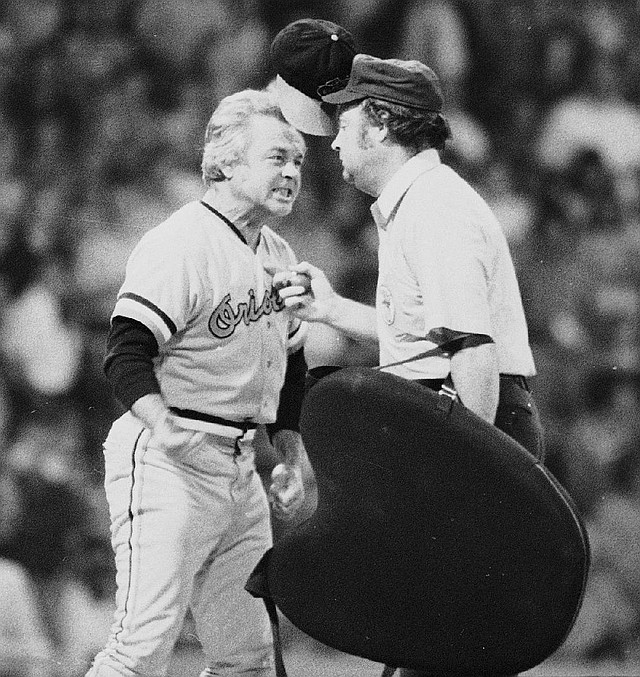Weaver, argumentative, authoritative, dies at 82
Baltimore Orioles Manager Earl Weaver “flips his lid” as he protests a call by home plate umpire Marty Springstead during a game against the Chicago White Sox on July 13, 1974. Weaver, the fiery Hall of Fame manager who won 1,480 games with the Baltimore Orioles, died Saturday. He was 82.
Sunday, January 20, 2013
BALTIMORE — Earl Weaver always was up for an argument, especially with an umpire.
At the slightest provocation, the Earl of Baltimore would spin his hat back, point his finger squarely at an ump’s chest and fire away. The Hall of Fame manager would even tangle with his own players, if necessary.
All this from a 5-6 pepperpot who hated to be doubted.
Weaver was reviled by some but beloved in Baltimore and remained an Oriole to the end.
The notoriously feisty Hall of Fame manager died at 82 on a Caribbean cruise associated with the Orioles, his marketing agent said Saturday.
“Earl was a black and white manager,” former Orioles ace and Hall of Fame member Jim Palmer said Saturday. “He kind of told you what your job description was going to be and kind of basically told you if you wanted to play on the Orioles, this was what you needed to do. And if you couldn’t do it, I’ll get someone else.
“I know that’s kind of tough love, but I don’t think anyone other than Marianna, his wife, would describe Earl as a warm and fuzzy guy.”
Weaver took the Orioles to the World Series four times over 17 seasons but won only one title, in 1970. His .583 winning percentage ranks fifth among managers who served 10 or more seasons in the 20th century.
Dick Gordon said Weaver’s wife told him that Weaver went back to his cabin after dinner and began choking between 10:30 and 11 Friday night. Gordon said a cause of death has not been determined.
“Earl was a terrific manager,” said Dan Duquette, the Orioles’ vice president of baseball operations. “The simplicity and clarity of his leadership and his passion for baseball was unmatched.”
A statue of Weaver was dedicated last summer at the Camden Yards flag court, along with the rest of the team’s Hall of Fame members.
“Earl Weaver stands alone as the greatest manager in the history of the Orioles organization and one of the greatest in the history of baseball,” Orioles owner Peter Angelos said.
Weaver was a saltytongued manager who preferred to wait for a three-run home run rather than manufacture a run with a stolen base or a bunt.
He had a reputation as a winner, but umpires knew him as a hothead. Weaver would often turn his hat backward and yell directly into an umpire’s face to argue a call or a rule, and after the inevitable ejection he would more often than not kick dirt on home plate or on the umpire’s shoes.
Orioles programs sold at the old Memorial Stadium frequently featured photos of Weaver squabbling.
He was ejected 91 times, including once in both games of a doubleheader.
Weaver finished with a 1,480-1,060 record, and won Manager of the Year three times. He entered the Hall of Fame in 1996.
His ejections were overshadowed by his 5 100-victory seasons, 6 American League East titles and 4 pennants. Weaver was inducted 10 years after he managed his final game with Baltimore at the end of an ill-advised comeback.
In 1985, the Orioles’ owner at the time, Edward B. Williams, coaxed Weaver away from golf to take over a struggling squad. Weaver, who first retired after the 1982 season, donned his uniform No. 4, which had already been retired by the team, and tried to breathe some life into the listless Orioles.
Baltimore went 53-52 over the last half of the 1985 season, but finished seventh in 1986 with a 73-89 record. It was Weaver’s only losing season as a major-league manager, and he retired for good after that.
“If I hadn’t come back,” Weaver said after his final game, “I would be home thinking what it would have been like to manage again. I found out it’s work.”
Former umpire Don Denkinger said he called one of Weaver’s last games in the majors.
“He comes to home plate before the game and says, ‘Gentlemen, I’m done.’ He told us the only way he’d ever come back is if he ran out of money,” Denkinger told The Associated Press by phone from Arizona. “I told him that if he ever ran out of money to call the umpires’ association and we’d take up a collection for him.
“We’d do anything, just to keep him off the field and away from us.”
By the numbers
World Series championship 1 American League pennants 4 100-victory seasons 5 American League East titles 6
91 Times ejected by umpires, third all time to Bobby Cox’s 158 and John McGraw’s 131
Career winning percentage .583
Career victories 1,480
Sports, Pages 32 on 01/20/2013
